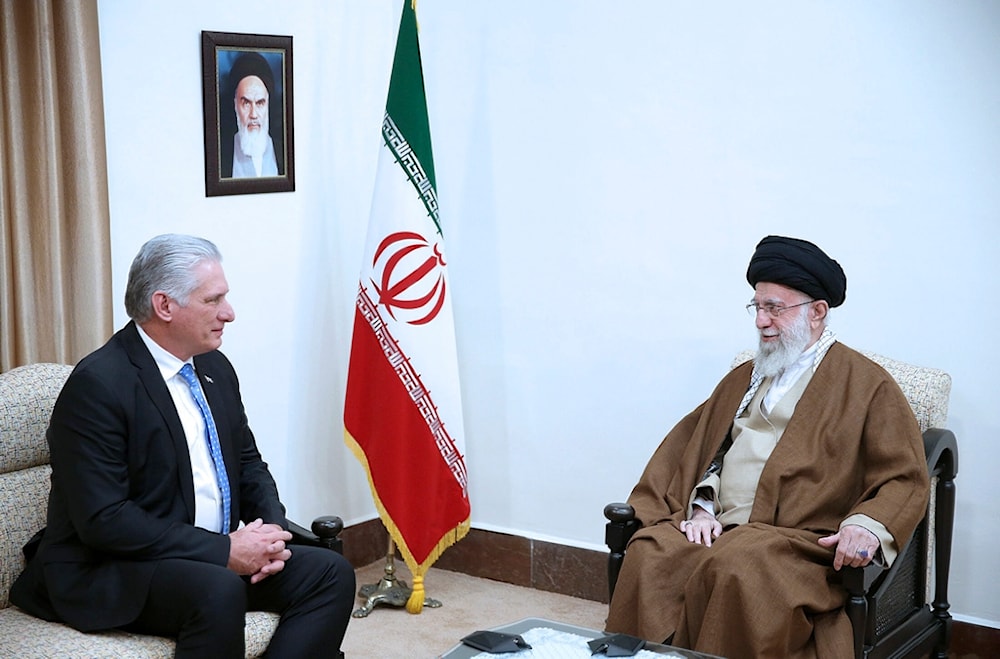Iran, Cuba should form coalition to counter US imperialism: Khamenei
Iran's Supreme Leader told the Cuban President that the current genocide in Gaza has reached a scale widely acknowledged worldwide, making denial of Western malevolence increasingly untenable.
-

In this photo released by the official website of the office of the Iranian leader, Ayatollah Sayyed Ali Khamenei, right, speaks with Cuban President Miguel Díaz-Canel in their meeting in Tehran, Iran, Monday, Dec. 4, 2023 (Office of the Iranian Leader via AP)
During a visit by Cuban President Miguel Díaz-Canel and his delegation for a meeting in Tehran on Monday, Ayatollah Sayyed Ali Khamenei, the Leader of the Islamic Revolution, expressed the idea that leveraging the political and economic potentials of both Iran and Cuba could be harnessed to form a coalition aimed at countering US imperialism, MEHR news agency reports.
"These potentials and capabilities should be used to form an alliance and coalition among countries that share an approach against the United States and other Western bullying states," Ayatollah Khamenei said during the meeting.
"By focusing on economic cooperation, this coalition can take a common and effective position on important global issues such as the Palestinian issue," he added.
The Cuban President said during his meeting with Sayyed Khamenei that relations between Cuba and Iran are on the right track and we are focusing on deepening economic relations
Cuban President Miguel Díaz-Canel noted that International organizations are watching silently the killing of thousands of Gaza residents, and this is surprising, adding that what is happening in Gaza is an "unacceptable genocide".
Díaz-Canel concluded by saying that Cuba and Iran can stand alongside each other, especially in the face of American interference and sanctions
Western aggression: undeniable
Speaking on the genocide in Gaza, Ayatollah Khamenei said that Israeli aggression has been ongoing for the past 75 years and that torture and massacres have always characterized the prolonged occupation.
"But now the catastrophe in Gaza has grown too big that everyone in the world knows about and it is not possible to deny that," the leader said.
Read more: Al-Aqsa Flood aimed at 'de-Americanization': Sayyed Khamenei
"The relations between the two countries should be further strengthened in various fields, including scientific cooperation," he added, suggesting that the Cuban side seizes the opportunity presented by Mr. Raeisi's government being in office to enhance bilateral relations and actualize various agreements and contracts.
"The Cuban revolution and the personality of Mr. Castro used to greatly inspire Iranian revolutionaries before the victory of the Islamic revolution, and the reason for that was his honesty in his revolutionary positions," he further stated.
Cuba, Iran walk a revolutionary path
The leader highlighted that "revolutionary honesty," "revolutionary persistence," and "revolutionary seriousness" are shared attributes between the Cuban Revolution and the Islamic Revolution in Iran.
"Relations between Iran and Cuba have been in the right direction since the victory of the Islamic Revolution, and in our talks in Tehran, we concentrated all efforts to deepen these relations, especially in the economic and commercial fields," Cuban President Miguel Díaz-Canel said.
"The two countries can complement each other in various fields, especially in dealing with the interventionist actions and sanctions on the part of the United States and its allies," he added
"Iran and Cuba can also increase their communication in international cooperation and be influential in important global issues such as Palestine," he further stated.
"What is happening in Gaza today is an unacceptable genocide and international organizations have closed their eyes to the killing of tens of thousands of people in Gaza, two-thirds of whom are children and women. They (Western powers) complained against Russia and accused it of the killing of civilians, now they are silent against the killing of tens of thousands of people in Gaza, and this shows a terrible situation in the world."
Read more: Raisi says support for Palestine outlined in Republic's constitution
Earlier in the day, the Cuban President and his delegation had completed a meeting with Iranian President Ebrahim Raisi, followed by a press conference.
During the meeting, both nations agreed to sign documents and memoranda of understanding to enhance and further bilateral relations and cooperation.
The seven agreements signed today entailed cooperation in energy, agriculture, health, medical sciences, technology, and communications, a strategic agreement on vaccine production, and the exchange of medical expertise.
The visit marks the first by a Cuban President to Iran since the June 1991 visit by the late Fidel Castro.
Earlier in June this year, Raisi visited Havana during a regional tour in Latin America, at an official invitation from his Cuban counterpart. During the visit, six documents and memoranda of understanding were signed by senior officials from both countries for cooperation in multiple realms.

 4 Min Read
4 Min Read








